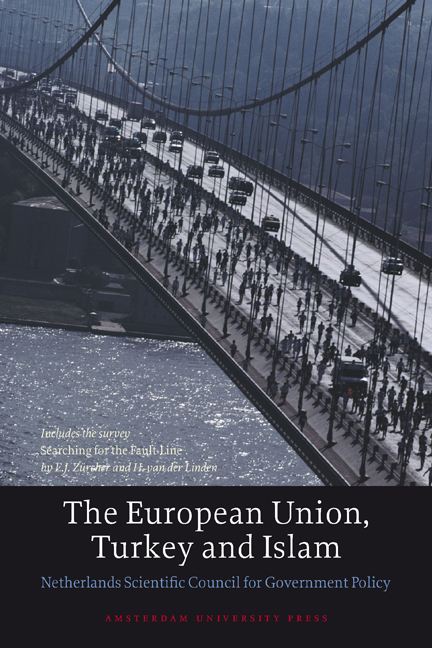Book contents
- Frontmatter
- Contents
- Summary
- Preface
- 1 Introduction
- 2 The European Union and Religion
- 3 Turkish Islam and the European Union
- 4 Conclusions
- Epilogue
- Literature
- Searching for the Fault-Line
- 5 Introduction: Turkey – Fault-Line, Frontline or Test Case?
- 6 Turkey’S Current Islamic Landscape
- 7 Turkish Islam and the Eu: a Clash of Civilisations?
- 8 Conclusion: Turkish Islam and European Civilisation
- Literature
- Websites
6 - Turkey’S Current Islamic Landscape
Published online by Cambridge University Press: 14 January 2021
- Frontmatter
- Contents
- Summary
- Preface
- 1 Introduction
- 2 The European Union and Religion
- 3 Turkish Islam and the European Union
- 4 Conclusions
- Epilogue
- Literature
- Searching for the Fault-Line
- 5 Introduction: Turkey – Fault-Line, Frontline or Test Case?
- 6 Turkey’S Current Islamic Landscape
- 7 Turkish Islam and the Eu: a Clash of Civilisations?
- 8 Conclusion: Turkish Islam and European Civilisation
- Literature
- Websites
Summary
This chapter describes the most important aspects of contemporary Turkish Islam. Since this contemporary landscape is the outcome of several radical transformations in the past, we will regularly refer back to crucial historical backgrounds that decisively shaped these important contemporary developments.
ISLAM AND THE STATE
THE ‘28 FEBRUARY PROCESS’: CONFRONTATION BETWEEN RELIGION, SOCIETY AND STATE
On 28 June 1996, the Turkish Republic witnessed an event unprecedented in its history since its creation in 1923: a politician who explicitly allowed himself to be inspired, both politically and personally, by Islamic standards and values, was sworn in as prime minister. Necmettin Erbakan, the leader of the Welfare Party, owed this post to his election victory in December 1995 (when he received 21.3 per cent of the vote) and to the shrewd manner in which he had exploited the divisions among the other political parties. Erbakan's governing coalition, with the conservative, Western-oriented and secular True Path Party, seemed to herald a new era in modern Turkish history. However, it soon emerged that this development was anathema to the secular state machinery.
On 28 February 1997 the Turkish army leadership launched a campaign in which it identified ‘Islamic fundamentalism’ (irtica, literally: ‘reactionary inclination) as the largest threat to Turkey's national security, worse than Kurdish separatism or foreign threats. Through the National Security Council, the very powerful body within which the military leadership advises the cabinet, the army presented a list of eighteen conditions that the Erbakan government had to fulfil. The implicit threat behind these demands was clear: the army would bring down the government if it failed to meet them. When the Erbakan government hesitated and dawdled with their fulfilment, the military organised a campaign in which the media, the judiciary, the bureaucracy and eventually also the parliamentary representatives of the True Path Party, were all lobbied and mobilised against the government. Trade unions and employers’ organisation formed their own ‘Secularist Front’. As a result of this pressure, the Erbakan government fell on 18 June 1997.
- Type
- Chapter
- Information
- The European Union, Turkey and Islam , pp. 93 - 146Publisher: Amsterdam University PressPrint publication year: 2004



